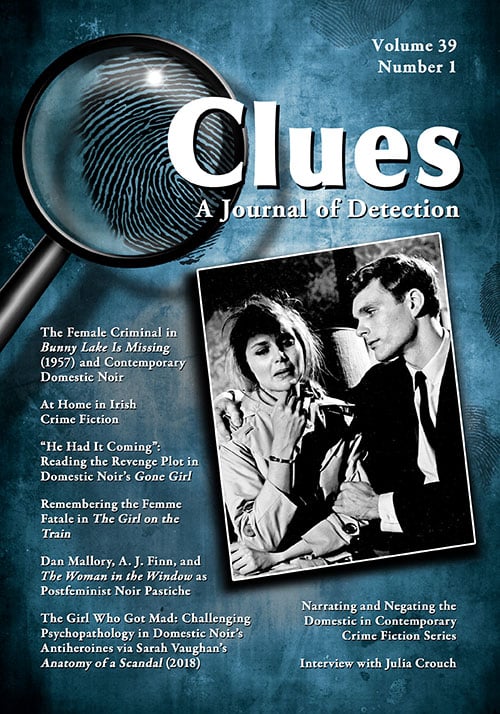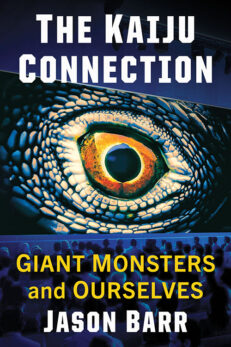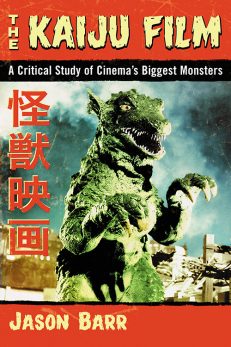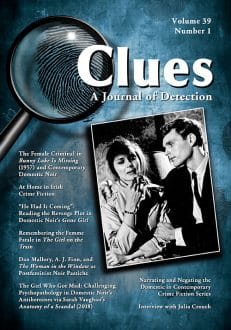Clues: A Journal of Detection, Vol. 39, No. 1 (Spring 2021)
Print Back Issue$30.00
In stock
About the Book
BACK ISSUE
This is a single back issue only. To order a current subscription, or for more information, please visit the journal’s web page at CluesJournal.com. Back issues from earlier volumes of Clues are available for order subject to availability. Also, single issues of the current volume may be ordered one at a time. Individuals may order back issues directly from our online catalog, and the charge for individuals is $30 (excluding postage). Issues from Volume 33 to the present are also available in ebook format on Kindle, Nook and Google Play.
The charge for single issues for institutions is $75 per issue (excluding postage). If your institution requires a back issue, please contact us to order at the appropriate rate.
About the Author(s)
Bibliographic Details
Executive Editor Caroline Reitz
Managing Editor Elizabeth Foxwell
Consulting Editor Margaret Kinsman
Format: softcover (7 x 10), back issue
Pages: 120
Bibliographic Info:
Copyright Date: 2021
ISSN 0742-4248
Imprint: McFarland
Table of Contents
Theme Issue: Domestic Noir
Guest Editors: Eva Burke and Clare Clarke
Introduction: Domestic Noir
Eva Burke and Clare Clarke 5
The guest editors discuss the development of the domestic noir subgenre and the Table of Contents of this theme issue of Clues, including an interview with British author Julia Crouch, who coined the term domestic noir, and articles on Irish and Scandinavian domestic noir; women’s book groups; mid-century antecedents of domestic noir; and authors such as A. J. Finn (aka Dan Mallory), Gillian Flynn, Tana French, Paula Hawkins, and Evelyn Piper (aka Merriam Modell).
At Home in Irish Crime Fiction
Brian Cliff 13
The author discusses the connections among domestic noir, Irish crime fiction, and the wider Irish literature, including examples from works by Jane Casey, Sinéad Crowley, Tana French, Catherine Ryan Howard, and Liz Nugent.
“I Am Not the Girl I Used to Be”: Remembering the Femme Fatale in The Girl on the Train
Rosie Couch 24
This article situates Rachel from Paula Hawkins’s novel The Girl on the Train (2015) as a contemporary incarnation of the femme fatale, redeployed within the domestic noir subgenre. The analysis demonstrates how Rachel’s perspective works to enact a feminist backlash against postfeminist rhetoric.
The Girl Who Got Mad: Challenging Psychopathology in Domestic Noir’s Antiheroines via Sarah Vaughan’s Anatomy of a Scandal (2018)
Liz Evans 36
The author argues that Sarah Vaughan’s legal thriller Anatomy of a Scandal (2018) challenges domestic noir’s questionable tendency to pathologize anger and badness in its female protagonists (often depicted as survivors of rape or abuse) while showing how the persistent alignment of negative emotion with psychological instability undermines these central characters by impeding their self-agency.
Smoke and Mirrors: Dan Mallory, A. J. Finn, and The Woman in the Window as Postfeminist Noir Pastiche
Roberta Garrett 47
The author discusses The Woman in the Window by A. J. Finn (pseudonym of Dan Mallory), examining Finn’s treatment of female characters and the tropes of the noir and domestic noir subgenres through the lens of postfeminist criticism.
“He Had It Coming”: Reading the Revenge Plot in Domestic Noir’s Gone Girl (2012)
Katharina Hendrickx 60
This article examines Gillian Flynn’s Gone Girl (2012) and its popularity with female readers. It suggests that female readers are not only interested in the portrayal of women’s experiences but also engage with the depiction of the revenge plot, which allows women readers to negotiate their frustration and anger with the current postfeminist climate.
Home and Home-Less: Narrating and Negating the Domestic in Contemporary Crime Fiction Series
Elspeth Latimer 72
The Annika Bengtzon series by Swedish author Liza Marklund challenges the evasion of domesticity typically seen in contemporary crime fiction series. By engaging with themes prevalent in domestic noir and by redirecting “the hero’s journey” toward self-discovery rather than outward conquest, Marklund feminizes the traditionally masculine conventions of the series form.
Dangerously Good Women: The Female Criminal in Bunny Lake Is Missing (1957) and Contemporary Domestic Noir
Erin A. Smith 86
In U.S. women’s Cold War crime fiction, plots obsessed with male sexualized violence frequently end with the arrest of a female perpetrator. The author traces the influence of Cold War fiction on contemporary domestic noir, analyzes Evelyn Piper’s Bunny Lake Is Missing (1957), and compares Cold War plots with examples from contemporary domestic noir.
Interview with Julia Crouch
Eva Burke 99
Author Julia Crouch discusses the origins of the term domestic noir; the roles of women, class, and trauma in such works; and aspects of characters and readership.
Killing Bluebeard: Claiming Subversive Femininity in Agatha Christie’s “Philomel Cottage” and The Stranger
Mary Anna Evans 104
This article considers the traditional tales that serve as source texts for Agatha Christie’s 1924 story “Philomel Cottage” and its 1932 adaptation, The Stranger, revealing an intertextuality that speaks to the ongoing societal evolution that underpins her narratives and interrogating ways that crime literature addresses women’s treatment by their society’s laws.
REVIEWS
Janice M. Allan and Christopher Pittard, Eds. The Cambridge Companion to Sherlock Holmes. Anissa M. Graham 115
Julie H. Kim, Ed. Crime Fiction and National Identities in the Global Age: Critical Essays. Stewart King 116
Antoine Dechêne. Detective Fiction and the Problem of Knowledge: Perspectives on the Metacognitive Mystery Tale. Dominique Jeannerod 118
Author Guidelines are on page 120.
Book Reviews & Awards
- “Clues is a must-have for readers and writers of crime fiction. Scholarly, thought-provoking, wide-ranging in its topics, Clues covers the crime and thriller map.”—Sara Paretsky
- “A. Conan Doyle, notoriously resentful of Sherlock Holmes’s success, liked to scorn ‘police romances’ as less significant and worthy of his talents than his other literary work. If he could have read Clues, the thinking mystery reader’s journal, he would surely have felt differently—and learned much he never realized himself about even his own landmark contribution to the genre, from which so much else by others has flowed.”—Jon Lellenberg, U.S. agent for the Arthur Conan Doyle estate
- “I love reading Clues. Every issue provides thought-provoking, well-researched articles. The variety and scope of the material found in Clues makes an unparalleled, ongoing contribution to our understanding of the role of crime fiction in our culture, and the genre’s reflection of its time and society.”—Jan Burke, Edgar-winning author of The Messenger (2009)
- “Clues is an important journal. It carries the torch of tradition that is the backbone of detective fiction. It goes below the surface and gets to the heart of what makes the genre so fascinating and valid today”—Michael Connelly, author of the Harry Bosch novels, including The Overlook (2007)
- “for erudite and fascinating truths about mysteries, follow the clues to Clues, the scholarly journal that is an essential resource for every serious student of the mystery”—Carolyn Hart, author of Death Walked In (2008)
- “with scholarship ranging from Poe to Peters, nothing beats Clues”—Joan Hess, author of Mummy Dearest (2008).





